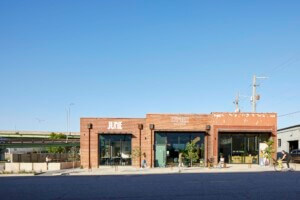A biking first for the Western Hemisphere is about to hit the streets in Birmingham, Alabama. While the American south is better known for its legacy of car-first sprawl, Birmingham city leaders hope a new bike share program will get residents and visitors to pedal their way on two wheels for short trips in the city’s core—and they’re getting an “assist” from a new prototype in Canada.
Traditional bike share programs include tougher-than-usual bikes able to handle the abuse of the general public. According to a report in AL.com, Birmingham’s bikes will feature built-in electric-assist technology that uses small motors to help the weary pedaler make it up steep terrain. But Birmingham officials have been touting the city’s flat topography among the selling points for the system, so the “assist” could end up replacing the footwork outright. The electric-assist bikes “were included to lessen barriers to using the system for people not as experienced with hillier areas of the city,” the website reported.
Whether or not the new system is used for its health benefits or simply falls back on its ability to reduce congestion, improve air quality, and provide a transportation alternative to city residents, Birmingham plans to launch 400 bikes and 40 kiosks across the city’s core this fall—a good size system for a city of 212,000 people and a region of 1.14 million. The plan calls for 100 of those bikes to be electric assist.
Birmingham chose Quebec, Canada–based Bewegen Technologies on Monday to supply the bikes and kiosks after a number of companies submitted proposals in January. The city’s economic development agency, REV Birmingham, will administer the program. Funds come, in part, from a $2 million federal CMAQ grant aimed at mitigating congestion and improving air quality. The city is chipping in another $400,000. Operating costs are expected to come from member payments and corporate sponsorships.
Bewegen—named after the Dutch and German word for “to move”—launched their prototype electric bike at a conference in Pittsburgh last September and plans pilot projects in Quebec and Portugal later this year. The company’s CEO, Alain Ayotte, was one of the founders of Montreal’s Bixi bike share, and served as President and CEO of Public Bike System Company (PBSC) which has supplied major systems in New York City, Chicago, and Washington, DC. PBSC went through a drawn out bankruptcy in 2014, about a year after Ayotte left the company. In an interview with the Bike Share Blog, Ayotte discussed his vision for the future of electrified bike share:
Conventional bike-sharing was a good start, but has many limitations. The modal share numbers speak for themselves. They limit the impact that bike-sharing can have on the urban transportation mix of a city. This also limits the pool of riders and the types of use they can get out every trip. I believe that shared pedelec (electric-assist) vehicles are truly the missing link in urban mobility and will soon become the norm.
The system’s pricing structure is still being worked out, but it will include annual memberships and credit card options for short term rentals. The city is crowdsourcing the kiosk locations and plans to launch a website and smartphone app later this summer. Decals will be placed at proposed kiosk locations and citizens can text their thoughts about each one to system organizers.
While this system is novel for its use of electric-powered bikes, bike share is not new in the south. Cities like Atlanta, Nashville, Louisville, and Chattanooga have launched, or are planning, systems of their own. The nation’s first bike share program began in Washington, D.C., in 2010 and dozens more programs have popped up in cities large and small across the country.










